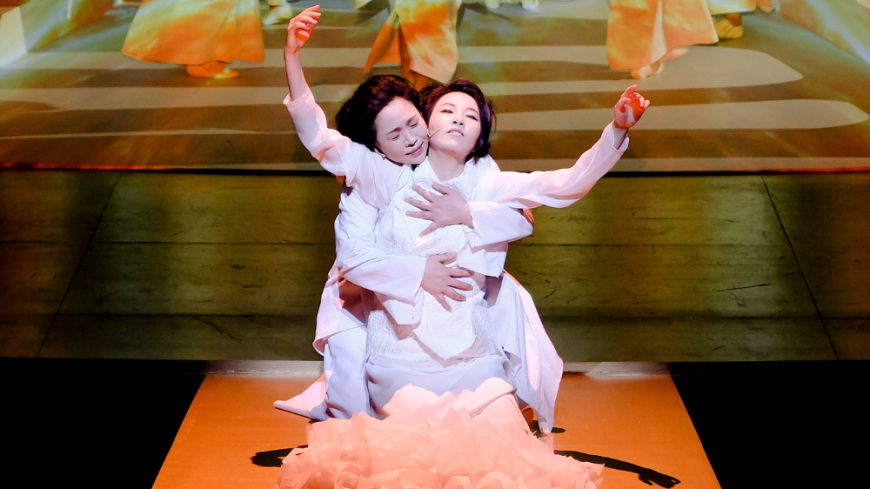
This epic operatic adaptation of Euripides’ tragedy (Bae Sam-sik) champion the women that remain among the ashes of the Trojan war in Trojan Women, a brilliant mix of music, dance, and theatre brought to life by over 25 singers, actors, and musicians.
The stark set looms large, a shadow cast across much of the stage, this setting for a destroyed Troy. Our Hecuba lies motionless downstage while the English surtitles lament of laughter lost, bodies forgotten in the rubble, a river flowing of blood and fruitless pleas for help from the gods.
Kim Kum-mi as Hecuba rises like a phoenix from the ashes, the centrepiece of this story, with vocals guttural and commanding yet sweet in the few softer moments. Thrumming of the drums against soaring cries of vibrato sound and a projection of a rough ocean dapples across the palatial ruins centrestage in forced perspective. This is the first of many mesmerising projections incorporated into the set design of the opera which transform the space from stoic to a dimensional and alive world.
As the story of these Trojan women and Greek men plays out amongst the fall of a great queen, individual histories are told, ambitiously, yet successfully under the direction and conception of Ong Keng Sen, painting many of the grand characters as complex, with shades of likeability and repugnance shown for each regardless of their role as captor or captive. The formerly enslaved citizens of Troy see this descent as a chance to change their fate, or, at least, endure more of the same in a continuation of their trauma; Hecuba is unsettled by the upset of class division, but the reality is all of the women find themselves levelled, stripped of their dignity and doomed to a miserable fate. Clawing at the scraps of her life, this fallen ruler sees even her surviving children desert her: Cassandra to her revenge, Polyxena to her sacrifice and Andromache to the fury of blame. Our imperfect protagonist initially projects her anger not at the oppressive invaders but at the women around her, especially Helen and goddess Artemis. The Greeks, donning grey instead of white, see themselves as conflicted villains, capable of mercy despite their heinous deeds, even King Menelaus with his bloodied hands.
Yi So-yeon as Cassandra is piercing, ablaze with the mad glee at her impending revenge, seizing martyrdom to turn her forced marriage to Agamemnon into his misery as she has the ear of the god Apollo. As Cassandra’s fury builds, the projections of fire rises alongside her powerful voice with sears into every crevice of the Festival Theatre, a chilling, awesome moment.
In addition to Yi So-yeon’s performance, the striking tableaus of the ensemble numbers are the highlight of the piece, the chorus of women clad in white (Heo Ae-sun, Na Yoon-young, Seo Jung-kum, Lee Youn-joo, Min Eun-kyung, Cho Yu-ah, Wang Yun-jeong, Kim Woo-jeong) displaying grief and strength in equal measure.
The red thread they hold and unravel hearkens back to the Greek myth of Ariadne, her red thread signifying women’s intuition and its role in showing them the wisdom to find their way out of the recesses of whatever labyrinth holds them hostage.
Pansori, the type of Korean musical storytelling applied throughout Ahn Sook-Sun’s compositions, is a natural and fitting mode of art for this famed tragedy. The songs in Trojan Women often feature phrases which end in a falling, crying cadence; it is no wonder that artists training in this technique practice next to a waterfall, aiming to copy the scale and range of the water cascading over rocks. Sori, meaning sound in Korean, is more than singing - the sound can evoke the wind or sadness. The pansori of this opera is pained and harrowing, a true musical expression of a tormented soul.
In a short display, Kim Jun-soo as misunderstood Helen (dressed in grey but still at odds with the Greeks) deviates briefly from the operatic structure and invites marks of pop with a beautiful piano accompaniment. Hecuba’s anger towards the great beauty is redirected at the gods in the finale, as she climbs to the top of the burnt city, formidable in her grief, unwilling to even surrender its ruins.
Ultimately, this relentless war (and at 1 hour 50 minutes with no interval it is, in fact, relentless), proves that there are no victors, only gods’ playthings, yet their despair cannot triumph against the potency and resilience of these women.
Festival Theatre, 9 - 11 August 2023, 7:30pm

